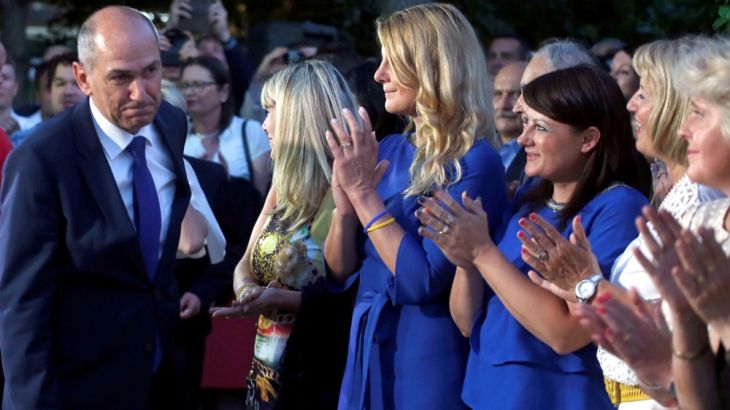Far-right party faces hurdles in forming Slovenia parliament
Anti-migrant rhetoric means former Prime Minister Janez Jansa faces an uphill battle to find partners for a coalition.

Former Slovenian Prime Minister Janez Jansa’s far-right anti-immigrant party won nearly double the seats than its closest opponent in parliamentary elections but faces major hurdles in forming a new government.
Slovenian President Borut Pahor said he will offer Jansa’s Slovenian Democratic Party (SDP) a mandate to form a government after his party won 25 out of the 90 parliament seats up for grabs.
Keep reading
list of 4 itemsKey takeaways as ex-Trump lawyer Michael Cohen testifies in New York trial
Will Israel’s war on Gaza sway South Africa’s election?
Lithuania’s Nauseda wins first round of presidential election
“I am not obliged to award the mandate to the relative winner of the election, but I will do so because I strongly believe in democracy,” Pahor was quoted in news reports as saying.
|
|
Jansa’s main opponent, Marjan Sarec, and his party won only 13 seats.
Analysts say Jansa faces difficulties in forming a new government because of accusations of radicalism, authoritarianism, and anti-immigrant rhetoric.
He is seen as a close ally of Hungarian Prime Minister Victor Orban who is also known for promoting far-right policies.
Sarec, a former comedian-turned-politician who lost to Pahor in last year’s presidential election, said on social media he will not support Jansa.
“I repeat, we are not forming a coalition with Slovenian Democratic Party. This summer will be twice as hot,” Sarec said, though he congratulated the winner.
“If Jansa calls us, we can spend some time talking over coffee, and that will not be a problem. But we will repeat what we have said so many times before – ‘there cannot be a coalition’.”
Sarec also congratulated current Prime Minister Miro Cerar, another former prime minister – Alenka Bratusek, and other socialists, whom he needs if he takes on Jansa in the fight to form a coalition government.
‘No coalition with Jansa’
Cerar’s Modern Centre Party said it was satisfied with the outcome of the polls. But current Foreign Minister Karl Erjavec’s party suffered an election debacle.
|
|
Those parties have all denied the possibility of forming a coalition with the SDP.
Jansa is the longest-running politician in Slovenia, a former Yugoslav republic that was the first to leave Yugoslavia in 1992.
Asked how he will form a new government, Jansa said, “When some heated heads cool off, we will talk about coalitions.”
About 30 years ago, Jansa, then a journalist with the Mladina newspaper, was arrested by Yugoslav authorities along with several others for allegedly revealing military secrets.
The arrests triggered protests demanding democratic change and political reform, which was considered the starting point of Slovenia’s secession.
Jansa was elected eight times in parliament and twice as prime minister. He also held the post of defence minister.
Slovenia was also the first of the former Yugoslav states to join the European Union and quickly adopted the euro as a common currency.